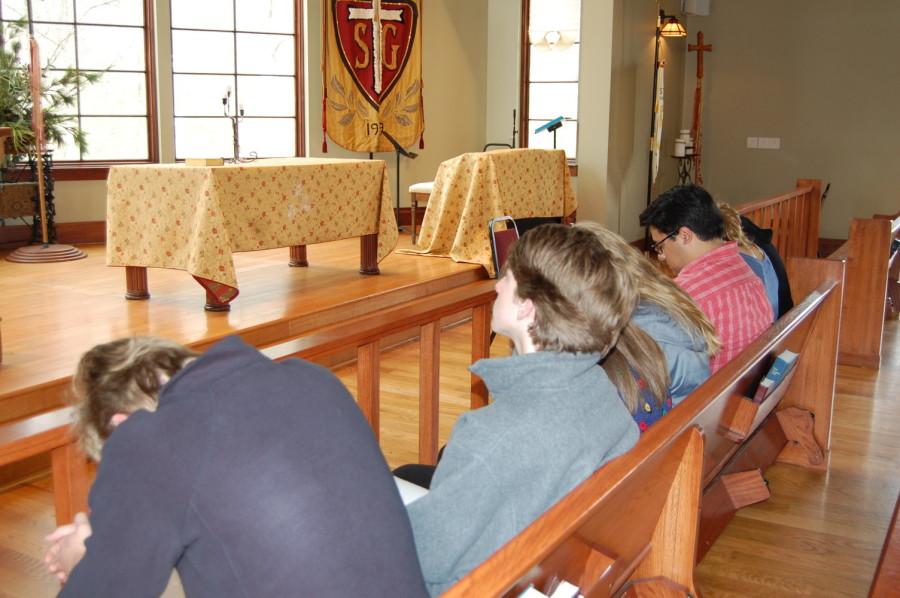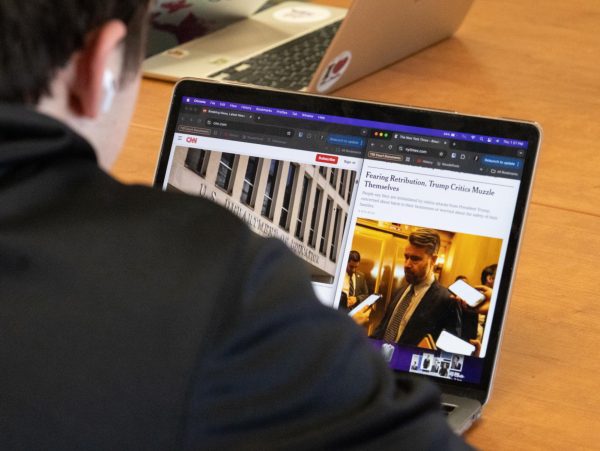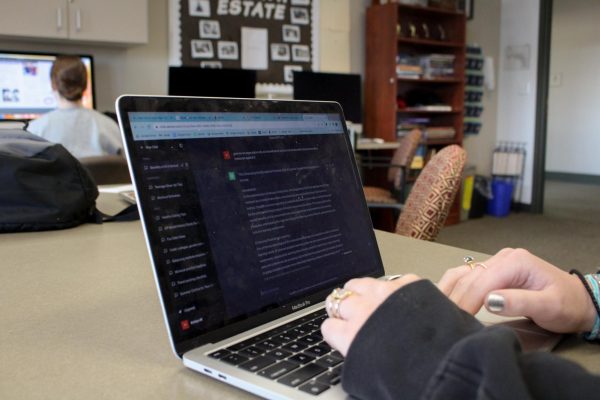Prayer isn’t the only way to find meaning
Why alternative chapels are necessary for inclusion
Photo: Annie Vento
A student looks straight ahead while his peers pray in the Agape Chapel. Alternative chapels were introduced to the St. George’s Upper School in 2006 and have evolved significantly since then.
If you look around in a chapel service, you will be able to quickly identify the students who are not saying the prayers.
Some of them may be Jewish or Buddhist, others may be atheist or agnostic may even be Christian. However, since people don’t wear signs around their necks stating what they believe, everyone is left to make assumptions, leaving those who aren’t praying in a vulnerable position.
I personally dislike organized religion, and after labeling myself as atheist, Buddhist and universalist over the years, I’ve decided I am unaffiliated. However, from fifth to eighth grade, I always said the prayers in chapels primarily because I didn’t feel that I had another option.
I wasn’t comfortable telling friends I wasn’t a Christian, so I went along with it and ”prayed” with them. Looking back now, I can see how this may be viewed as sacrilegious or disrespectful, since I said the words but didn’t believe them. Yet many students at St. George’s, an Episcopalian school, see only two options: don’t pray and be subject to scrutiny and embarrassment, especially if you aren’t yet comfortable with your beliefs, or pray so you can blend into the crowd.
Chapels are currently mandatory for all students, regardless of a student’s personal religious beliefs. Alternative chapels, like those offered for Ash Wednesday, should be offered more often.
Alternative chapels were introduced to the St. George’s Upper School in 2006 by Chaplain Brendan Gorham, although they are led by any teacher who is interested.
The annual alternative chapel service has evolved into a place where students from all religious backgrounds can gather to be spiritually engaged and learn more about themselves and the world around them.
When I first attended an alternative chapel two years ago, the service itself ran differently than a normal chapel service. Instead of set songs, prayers and a chapel talk from one person, students rose one by one and talked freely about their spiritual beliefs or experiences with religion. The conversation included passages from texts such as the Bible and Tao de Ching, and each person’s “speech” usually arrived at how, regardless of your religious beliefs, you should always prioritize being a good person to others.
These alternative chapels have the same amount of formality and meaning that regular chapels have. Just as traditional chapels strive to inspire students to be a better person or better Christian, alternative chapels also challenge students to think critically about their spirituality and internal moral code. However, the spiritual element in alternative chapels is more broad because they are non-denominational.
At the beginning of March, juniors visited Victory Ranch for their annual class trip, and on the last day, they separated into groups to create solutions for how to make St. George’s better. One group in particular worked in the student life category to improve chapels. Because they recognized that not everyone who attends St. George’s is Christian, they wanted to create assemblies in addition to chapels. Students would still attend chapel services, but assemblies would be a non-denominational service where anyone could speak, and the structure would be less formal.
One of the primary reasons they believed assemblies would serve St. George’s was, as they said in their presentation, “prayers aren’t the only way to find meaning.” Many students, such as this group of juniors at Victory Ranch, are beginning to find that our current chapel structure could be more inclusive of all students.
St. George’s states on its website that “our Episcopal values also lead us to our uncommon commitment to inclusion,” but we can do more to make sure that students never feel isolated and in the limelight when they don’t say the Lord’s Prayer. No student should ever feel like an outsider.
Although St. George’s makes it clear that it is religious and attendance in chapels is required, many parents send their children to St. George’s regardless of the student’s wants, including whether or not the student wants to attend a religious school. Although this problem is more difficult to solve, the student day-to-day experience can become more enjoyable if their religions are not only tolerated but accepted and embraced.
In order to achieve this acceptance, alternative chapels should offered in place of chapel services for students who feel uncomfortable with the current chapel services. Alternative chapels would still challenge students intellectually and spiritually, but their individual religious beliefs would be openly welcomed and encouraged.












